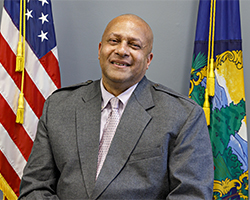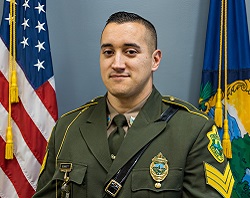The Vermont State Police is committed to fair and impartial policing and has developed and implemented a comprehensive program to ensure fair and impartial policing practices at all levels of the state police. These efforts include building relationships of trust with communities of color and other minority communities, diversifying our workforce, and improving our cultural awareness as the state of Vermont becomes more diverse. This office reflects the Vermont State Police’s continuing commitment to the importance of fair and impartial policing.
VSP established a Fair and Impartial Policing Committee in 2009. The committee meets four times a year and serves as an advisory group to the Vermont State Police. The purpose of the FIP committee is to discuss critical issues such as addressing bias in policing; addressing anti-Semitism, hate-motivated crime and incidents that affect LGBTQIA+ individuals and groups; building stronger relationships between law enforcement and the public; building trust within communities of color, marginalized communities and any group that has concerns about access to safety services; examination of VSP policies and procedures; training; recruitment and retention of diverse membership within VSP; collection and analysis of traffic stop and other data; and any other related topics that members wish to discuss. 
(RELATED: Read the Vermont State Police Use of Force policy)
Ultimately, the Vermont State Police intends to ensure that we are compassionate, professional and responsive to the needs of all people of Vermont, in part by being well informed by a diverse of group of residents who embody the FIP Committee. Everyone at the table has something to offer toward these goals.
Meetings of the Fair and Impartial Policing Committee are in March, June, September and December each year, typically at Vermont Law School in South Royalton.
(RELATED: Read the draft 10-point law enforcement reform initiative)
The initiatives for fair and impartial policing are overseen by the co-directors of Fair and Impartial Policing and Community Affairs, Capt. Barbara Kessler and Dr. Etan Nasreddin-Longo. Among the objectives of the co-directors:
Recruitment and hiring: Working closely with the Office of Professional Development to make improvements in our recruiting efforts, ensuring that prospective members have strong knowledge and understanding of national issues related to policing and are committed to ethical policing and cultivating strong relationships between police and the community.
Training: Keeping our membership effectively trained at the highest level to ensure we are meeting fair and impartial policing practices. Training for all members occurs annually.
Supervision and accountability: Training front-line supervisors to identify issues and effectively intervene when there are concerns. The state police uses a real-time web-based employee evaluation system to monitor uses of force, high-speed pursuits and civilian complaints. Instituting mechanisms to ensure accountability.
Outreach to diverse communities: Establishing relationships with a diverse range of Vermont citizens and community leaders, along with providing leadership at our Fair and Impartial Policing Committee. The co-directors work to bridge gaps between police and diverse communities in order to build trust and mutual understanding. Among VSP's partners: Pride Center of Vermont; Vermont Partnership for Fairness and Diversity; NAACP-Rutland; Windham County-NAACP; LGBTQIA Alliance of Vermont; and the Sudanese Foundation of Vermont.
Traffic stop data collection: Conducting comprehensive internal and external reviews of traffic stop data on a continuous basis and implement any necessary changes in policy and/or training. In addition, we post our raw annual traffic-stop data every summer on our department webpage for anyone to review and analyze.
Assessment of institutional practices: Reviewing all department practices from traffic enforcement to the promotional process to ensure that we are adhering to the basic principles of fair and impartial policing.
Policy: Continually reviewing and updating the department's fair and impartial policing policy, policies pertaining to victims and witnesses, and bias-incident reporting policies to help guide troopers as they make critical law-enforcement decisions.
Community resources: The following organizations offer additional resources for the public:



